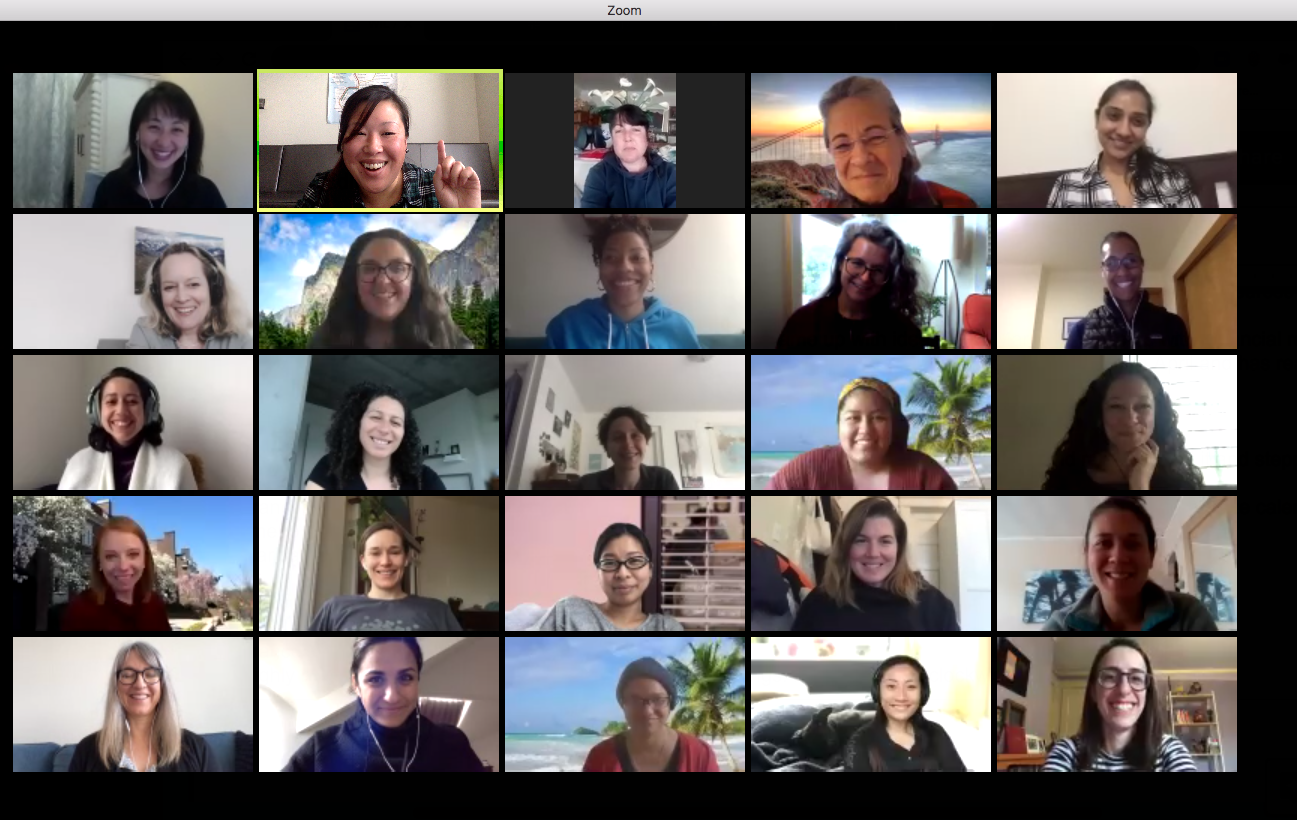This year, Coro’s revamped women’s leadership program enters its fourth year serving professionals across the Bay Area. We sat down with Coro’s Senior Trainer Masharika Prejean Maddison to talk about the history, successes, and future of Women in Leadership.

How would you describe the Women in Leadership (WIL) program, in three sentences or fewer?
Women in Leadership is designed to support women in advancing their professional, personal, and political capacity to tackle society’s biggest challenges together. WIL creates an inclusive space for women-identifying professionals to strengthen their leadership skills, grow their network, and make their value visible in the workplace.
In your view, what’s the Coro “special sauce” that differentiates WIL from other leadership programs?
The program is highly experiential and relies on the shared wisdom of participants to add to the overall learning experience. We believe that knowledge is sourced from the inside out and the outside in. That’s a huge differentiator, and is informed by Coro’s view of leadership — that leadership is a practice rather than a title or an inherent trait. We give people tools to strengthen six essential leadership competencies, anchored in a greater capacity to shape and influence outcomes.
As a facilitator, what most inspires you about watching women’s leadership journeys unfold?
It’s the moments where participants say, “It’s time to stop talking about this and start doing it.” When people articulate and implement their vision, putting the tools into practice. When people identify sources of courage and make time to affect change at multiple levels of society. That’s what I live for.
Some of the things that participants do after the program create significant ripple effects. The visible wins are laudable! However, I’m wired to seek out the wins that might be invisible from the outside. It’s an honor to bear witness to someone facing their own and others’ imposed doubts about their ability to affect change. The grip of inner doubt releases, and there’s a recognition that they have the capacity and aptitude to do great things.
We live in a nation of oppressive systems that were not designed for women to thrive in general, and especially women of color. For participants to navigate systems, mindsets, and internalized negative self-talk is a lot. To be sure, each and every participant was always capable of greatness, but maybe it took the experience of the program and this community of amazing individuals to help them realize it.
How are women’s experiences of leadership different? (i.e., why create a leadership development program just for women-identifying people?)
So much of our concept of leadership is informed by input and theories and frameworks designed by and for men, most often white men. WIL centers the unique and diverse experiences that women-identifying leaders from diverse backgrounds face in the workplace.
What do you see as the biggest untapped capacity of women leaders?
Women are often interested in getting underneath an issue at hand, getting to the heart of the matter. That capacity to understand and make space for people’s interests, rather than coming in with a fixed point of view, is an untapped capacity.
How do you see the program’s responsibility in reaching applicants who might otherwise not have access to this kind of experience — or who might not (yet) see themselves as leaders?
We have a tremendous responsibility to participate in the equitable access of this program — across race and ethnicity, across age, across income and education levels, across geographic representation, and more. We have a tremendous responsibility because if we’re going to tackle society’s biggest challenges together, we need people with diverse backgrounds to be the storytellers, the truth speakers, and the orchestrators of change.
What is your takeaway after facilitating the program for the past three years? How has it evolved?
We now have a robust network of alums, and that network continues to grow and thrive and reinforce the notion that we had when we began —which was, if we bring women together they will choose to be in community long after the program experience ends. That’s a tangible product of the work.
In terms of curricular evolution, we’ve gotten clear on where Coro can provide information and when to get out of the way, letting participants share their knowledge and experiences — and support each other in bringing their new learnings back to the workplace.
One thing that has not changed — and I hope never does — is the quality of our leader interviews. The purpose of a leader interview is to explore one person’s journey to and through their current personal and professional standing. We have such a diverse and robust list of leaders we’ve interviewed over the years — that’s a very important component.
No fewer than three WIL alumnae were elected to local office last November! To what do you attribute this impressive showing?
The encouragement that the participants provide each other is definitely a catalyst — the network effect is strong! Rather than wait for some nebulous external authority to give us permission to live into our greatness, sometimes it’s about giving ourselves and each other permission to do it, be it, embody it.
Also, I want to credit the Coro tools for clarifying how to influence change. We’ve demystified leadership. And that makes a difference.
The #MeToo movement and the Racial Justice Uprising have brought a lot of attention to the adversity faced by women, especially BIPOC women, in the workplace and beyond. Sometimes there seems to be a lot of lip service while the struggles remain daunting. What gives you hope about our capacity to achieve real, transformative change?
Can we take a moment to celebrate the seemingly eternal well of hope that fuels BIPOC women? Lord have mercy! To be clear, that well of hope was sprung from generations of toil and sacrifice at the hands of our ancestors, who sought to lead and influence outcomes in a way that centered social, racial, and economic justice. I think many people of color realize that if there is no hope … I don’t even want to finish that sentence.
There are many pragmatic, creative individuals who are doing the work. People like Vice President Kamala Harris and Stacey Abrams inspire me. There are artists like Asali DeVan Ecclesiastes and writers like Isabel Wilkerson and Mia Birdsong who use their talents to give voice to concepts that often go unspoken, yet are felt across homes and throughout communities. And then there are leaders like Liz Ogbu, Aisha Nyandoro, and Eileen Briggs, who work with the land, mothers, and on behalf of tribal groups. All of these people offer great hope.
The passage of the Women on Boards Bill also gives me hope, demonstrating that when women-identifying people at all levels and from many backgrounds work together, we can create sea change that leads to lasting impact on society. And provide our children with expanded models of the “faces” of leadership.
Flash forward to the year 2071. What does the leadership landscape look like in your best possible vision? What have all those WIL graduates been up to?
The Women in Leadership network will be so large and intentionally diverse that anyone who looks at the program will know a central value is to attract and bring in women from many different backgrounds, all still focused on solving our most pressing challenges.
In 50 years, race will be a very different conversation, and my hope is that there will be — though we probably won’t call them “leaders of color” in the future — but there will be leaders in place who will have a much more inclusive understanding of how to influence positive outcomes. Leaders who fundamentally understand and see the collective benefit in exercising power “with” rather than power “over.”
And I hope that many more of these future leaders are women, including nonbinary people across the gender spectrum, who see themselves as leaders and are received as such.
Senior Director of Training Masharika Prejean Maddison facilitates Women in Leadership, the Coro-UC Women’s Initiative for Professional Development, and the Workforce Leadership Network.
Interested in learning more about Women in Leadership? Check out these resources:
